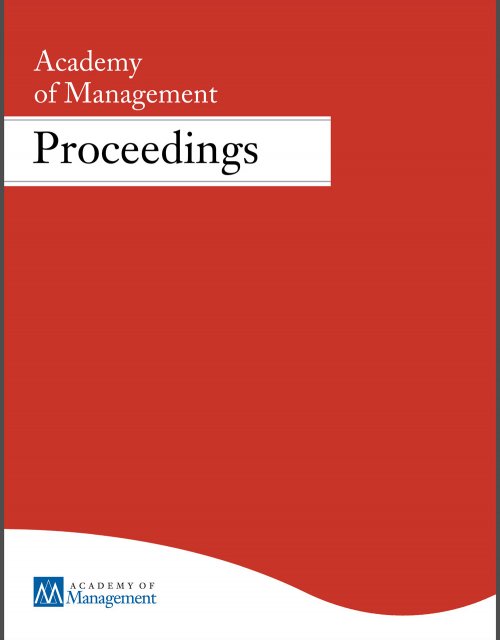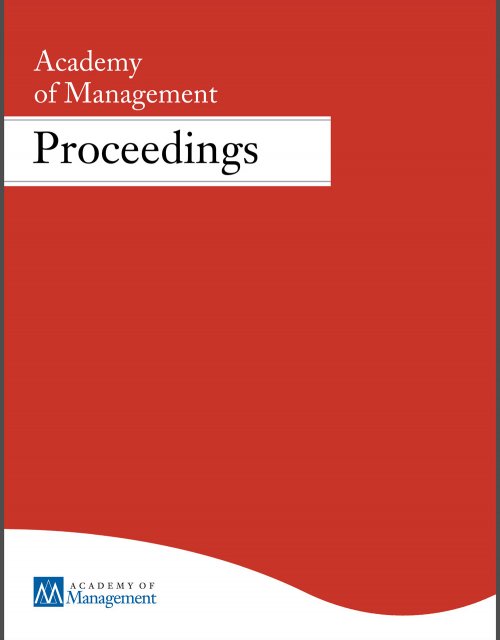Publication records
Subject(s)
Technology, R&D management
Keyword(s)
R&D incentives, tax incentives, innovation, technology
This article provides a structured overview on the most important features of the new German legislation awarding tax breaks for R&D active companies.
Volume
2021
ISSN (Print)
1868-2979
Subject(s)
Information technology and systems; Product and operations management; Strategy and general management; Technology, R&D management
Keyword(s)
digital identity, technology
The article deals with the potential that lies in the creation of a digital identity. More concretely, the article explores to what extent the customer experience can be improved by a digital/electronic identity system that allows customers to just use one single mobile app to pull data from various providers.
Subject(s)
Human resources management/organizational behavior
Keyword(s)
Leadership, remote work, emotional intelligence
Eloïse has a problem. The company’s board has decided that her team will be moved to a new location – one that is in a shabby building, located far off the beaten track, and (adding insult to injury) with a horrible staff canteen. The kicker: The board tasked Eloïse with informing her team, who will be returning from their home offices to this new pandemic workplace reality. In her latest article for Forbes, Nora Grasselli, program director of ESMT Executive Education, tackles what these tough situations demand of Eloïse and other executives who are having to manage the economic fallout of the pandemic for themselves and their teams. Often, they are left to manage it alone, under conditions of extreme stress and cut loose from network support. What, asks Grasselli, can Eloïse do to handle leadership solitude and its consequences?
ISSN (Print)
0015-6914
Subject(s)
Diversity and inclusion; Strategy and general management
Keyword(s)
Diversity, random selection, luck
In the final decision-making process for an application, companies want to avoid mistakes at all costs. This article explains two reasons why you should trust chance instead.
Journal Pages
66
Subject(s)
Diversity and inclusion; Strategy and general management
Keyword(s)
Diversity, random selection, luck
When it comes to hiring, blind luck can trump biased reasoning and generate a less-is-more effect.
Subject(s)
Entrepreneurship; Strategy and general management; Technology, R&D management
Keyword(s)
Innovation, leadership, luck
Exceptional innovations are often attributed to brilliant strategies or leaders with superior foresight. But luck is in fact necessary for exceptional innovations in many ways.
ISSN (Print)
0015-6914
Subject(s)
Human resources management/organizational behavior
Keyword(s)
Executives, career shocks, coaching
This is a practitioner article based on a recently published academic paper on career shocks of executive. The article explains the phenomenon of a career shocks and offers strategies for dealing with them.
ISSN (Print)
0015-6914
Subject(s)
Entrepreneurship
Keyword(s)
Design thinking, digital transformation, innovation, customer centricity
Business owner and managers are facing the challenge of how to best drive digital transformation in their organizations. Design thinking might be one method to address these challenges and, at the same time, support a mindset change within the companies.
Subject(s)
Human resources management/organizational behavior
There is a growing interest in the concept of employer attractiveness. Yet, research appears to be unsystematic in how it conceptualizes and studies the phenomenon. In this paper, we argue that thus far most research on employer attractiveness has combined perspectives about employer attractiveness of both prospective employees and for exiting employees, making therefore little differentiation with a reference to the question: For whom is the employer attractive? In this paper, we argue that this is problematic considering existing evidence signaling that there are differences in the employer attractiveness attributes between the two groups. With this paper, we aim to extend the literature on employer attractiveness by shifting the conversation to the perceptions of employees. We systematically review 48 articles on employer attractiveness from the employee perspective, and offer a model, capturing Inputs, Mediators and Outputs (IMO) of the concept. The paper concludes with a discussion of what our findings mean for future research and practice.
With permission of the Academy of Management
Volume
2021
ISSN (Online)
2151-6561
ISSN (Print)
0065-0668
Subject(s)
Strategy and general management
Superior profit usually depends on capturing opportunities that rivals fail to identify or utilize. A key challenge for strategists is how to be both different and viable. Prior research has tended to associate contrarian opportunities with rivals’ behavioral failures. Herein, we argue that contrarian opportunities can emerge endogenously in an ecology whenever there is a dominant logic. We develop our argument in the context of organizational design, in which the majority voting rule is demonstrated to be an efficient and typically mainstream approach for screening alternatives. We formally demonstrate when antimajority—an unconventional screening rule where acceptance depends on the minority’s approval and majority’s disapproval—exploits the opportunities left behind by the majority rule. We illustrate how a contrarian niche emerges, and its scope conditions using the case of an antimajority voting venture capitalist firm together with an evolutionary model of competing rules. More generally, a contrarian niche emerges not necessarily because the dominant firms have been suboptimal or inefficient but because their homogeneity predicts an exploitable blind spot, preserving opportunities for strategists who can afford to be contrary.
With permission of the Academy of Management
Volume
2021
ISSN (Online)
2151-6561
ISSN (Print)
0065-0668

